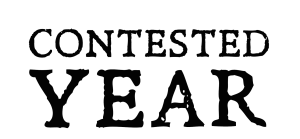The Contested Year editors are grateful for the information provided by Amazon reviewer, Thomas Reedy, in his Amazon post dated yesterday (Feb. 14, 2016) to wit: “Waugh’s use of an 1878 hoax newspaper fabricated from 17th century pamphlets, ‘The Weekley Newes, No. 19, for Munday 31st January, 1606’, to correct Professor Shapiro’s statement that no newspapers existed during the time of the Gunpowder Plot.”
The editors are in the process of correcting this oversight in the Contested Year file available on Amazon.

Contested Year co-editor, Alexander Waugh, provided the following commentary on the content of Reedy’s position paper posted in the review section of the Contested Year page on Amazon.
Alexander Waugh said:
[Thomas Reedy], you have five ‘ha’s in a row (‘Ha ha ha ha ha!’) to express your joy at finding a single slip in Contested Year so you can imagine how many “ha”s we have assembled to express our amusement at the mountain of blunders in Shapiro’s [Year of Lear] 1606.
Being a politer fellow than you I shall not line up a mile of “ha”s while pointing out the following errors in your “review”:
1. The earliest European newspaper dates from 1605 so Shapiro’s reference to 1606 as “an age in which there were as yet no newspapers….” remains incorrect, regardless of the authenticity of ‘Weekly Newes’
2. You are wrong about the prologue of ‘Ralph Roister Doister’ – it does not include a verbal use of roister but simply says “Our comedy or Interlude which we intend to play is named Royster Doyster in deede” so it looks as though it is you who has not read it rather than OED editors or myself.
3. The list of actors in [First Folio] does not entitle Shapiro to state without equivocation (as he does) that “Shakespeare knew the old venue [the Banqueting House] well and played there fourteen months earlier on November 1, 1604, when his last Elizabethan tragedy, Othello, had had its court debut.”As you perfectly well know not every single actor on that list played in every one of those plays. Shapiro has no evidence to support the statement I have just quoted.
4. You claim to be able to cite three pieces of evidence that show Shakespeare to have been an actor in his lifetime and yet produce only one of them, which does not show him to have been an actor in 1594\5 but a collector of revenues on behalf of the Chamberlain’s Men. Does everyone who attends to the invoicing of a theatre company qualify as an actor in your book? And what, pray, are your two other examples?
5. ” . . .the cloying superciliousness tone . . .” I take to be another of your errors – you need the word ‘of’ between ‘superciliousness’ and ‘tone’; also
6. “. . . the kind of quality is on offer here”, I think you mean ‘the kind of quality THAT is on offer here’.
7. The price of our book was not arrived at by assessing the worth of its content but by a desire to have it as cheap as Amazon would allow, so that as many people as possible might buy it. All proceeds are distributed to three charities.
8. You have posted a quotation: :” . . . there is no documentary evidence that Shakespeare was ever in the same room . . . ” and claim that this is not only typical but that you are very familiar with it – so familiar, it would seem, that you invented it out of your own head as this quotation does not appear in the book you claim to be reviewing.
9. Why do your imagined readers need your assurance that you are ” . . . in no hurry . . . ” to correct and improve your review? Is it because your clumsy first draft betrays the great rush that you were evidently in when you started it? I urge you, for your next instalment, to take a little more time and try to get your facts right. We look forward to your next post.
Pip Pip!
Alexander Waugh

You must be logged in to post a comment.